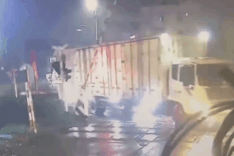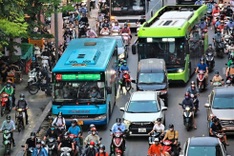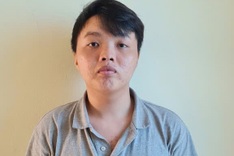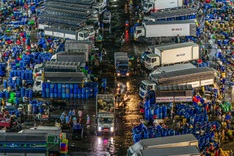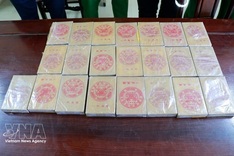 | |
| Virginie Servant in a traditional Vietnamese aodai. |
Virginie Servant, a French national, explores the Agent Orange impacts in Vietnam, in an exclusive story for DTiNews.
Buried beneath the thick foliage of the lush Vietnamese jungle, a terrible truth hides, conveniently left hidden by irresponsibility and misinformed prejudice.
I first visited Viet Nam in 2006, on a back-packer trip from Ha Noi to Can Tho, and instantly fell in love with its breathtaking landscapes, its warm and friendly people and its rich culture and history. I vowed that I would return, so when the opportunity came to give something back to this country, I seized it without a second thought.
The truth is so distressing and the reality is so stark that I cannot help but feel a deep sense of anger and frustration at the misguided policies originally led by the French colonial government, and the American administration after them.
The term “Agent Orange” covers a range of extremely toxic dioxide-containing herbicides, the dangerous effects of which were at least partially known in 1970, although the possibility of their toxicity was raised by the American scientific community as early as 1964. The American administration will shout out loudly that they could not have known about the devastating effects of the poison. Yet villagers in the Mekong Delta tell such a tale of complete destruction of life beneath the storm of chemicals, obvious and visible to all, that cries of innocence from the people responsible for the war seem misplaced.
Ngo Thi Tuyet Giao is a 27 year-old victim of the poison and cannot walk without assistance. Her legs are deformed and under-grown and she suffers intensely. She is a very intelligent biology graduate but cannot find work because of her physical condition. Her father told me about the attacks of Agent Orange on Vinh Vien village during the “Vietnam War”. When the poison chemical was pouring down from US helicopters, all the leaves quickly turned brown and fell from the trees, the animals became ill and the fish died in the rivers. The villagers would hide their heads under plastic sheets, but they could not stop their children from playing outside and coming into contact with the poison.

Ngo Thi Tuyet Giao.
Because research on the subject is still taboo, it is not clear yet what causes the mutations which impede growth in the victims, but statistical correlation shows that it is the generation born of these war children which suffers the most. Neither is the next generation safe. In the face of such blatant destruction, to suggest that there was no evidence that Agent Orange was dangerous is not just naïve; it is dishonest. Yet this dishonesty has allowed the perpetrators of this crime to literally get away with murder for the past four decades.
Although US war veterans have received compensation for the effects of Agent Orange, the case “Vietnam Association for Victims of Agent Orange/Dioxin v. Dow Chemical. Co.” (in which the defence argued with extreme ill-faith that chemical and bacteriological warfare was not banned in International Law at the time of the war) has killed any hope of reaching a settlement for Vietnamese victims in the US.

A group of relatives of AO victims with gifts from Viet Nam Village Children Fund.
Life has never been so difficult for the victims of Agent Orange. About a third of the victims whom I met in the summer 2009 would be able to lead a more meaningful life with some help such as transport, a wheelchair, and medication for the pain. They are often highly intelligent people whose most cherished desire is to reclaim their physical independence and earn a dignified living. Others suffer severe physical disability and minor mental impairment. These people can never lead a normal life, but they would certainly flourish in a therapy and skills training centre. In many of the worst cases, the victims suffer from complete physical and mental disability. Their life is a long and tormented one with no access to medical assistance.
I witnessed the work of a physiotherapist who happened to be visiting the area as a tourist. She worked on the limbs of a child victim for five minutes and the relief was so obvious that the child’s elderly grandmother burst into tears of despair “Why is nobody helping us? What is going to happen to her when I am gone?” The situation is even more pressing because many of these victim’s care takers are getting too old to look after their sick children.
At the moment, there is precious little help in comparison to the massive scale of needs. Laura Lam, an overseas Vietnamese author who founded the Viet Nam Village Children Fund (Enfants des Villages du Viet Nam), had begun providing assistance to the AO victims of Vinh Vien and Luong Tam in 2000. Twice a year the 55 families would gather at the house Laura had built for her parents to receive their gifts of dry food and patchwork quilts. The house is on “Helicopter Lane’, named by local residents after American helicopters spraying Agent Orange.


Families of AO victims in Vinh Vien village waiting to receive donations, August 14, 2009.
After discussing the current situation with some senior government officials who are most concerned, the charity is proposing ambitious plans for the province of Thai Binh where the largest concentration of victims is located. During the “Viet Nam war”, Thai Binh had sent the highest number of young men to the South. They became contaminated and the effects of dioxin were passed on to their children and grandchildren.
This plan includes a worldwide awareness campaign to fund the construction of a modern therapy and skills training centre where the victims will find relief, physical care and hope for the future. The new centre will work in cooperation with the existing centre run by the government.
The time has come to pull our heads out of the sand and face our past. We ourselves did not choose to inflict this plague on the people of Viet Nam, but we can choose to actively help its innocent victims.
-----------
Virginie Servant is a French national who is also fluent in English, Dutch and Spanish. She has a Master’s degree in International Law and Relations. She is a founding member of the Viet Nam Village Children Fund. In the summer 2009 she interviewed 30 victims of Agent Orange in Vinh Vien village, Long My district, Hau Giang province.


